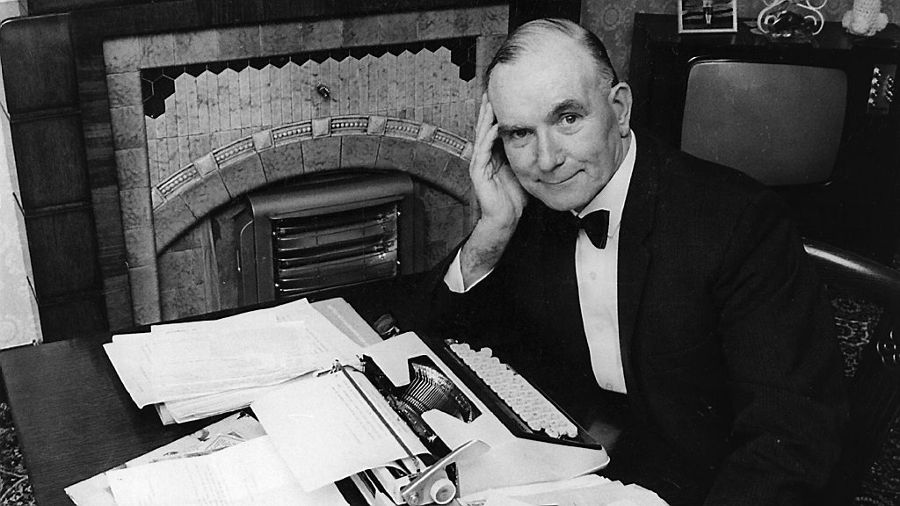‘PIERREPOINT’ has become a useful nickname for anyone who would knowingly hang you – or at least, anyone who wouldn’t lift a finger to help, should you happen to find yourself blindfolded and standing on a trapdoor with your ankles tied together.
Isn’t it surprising, then, to discover how principled the Pierrepoints – the family that, in an early example of outsourcing, gave this country three of its most memorable executioners – actually were?
In March, it was reported this week, Mealy’s will auction an expenses claim submitted by Thomas Pierrepoint for a double hanging at Mountjoy in August 1925. Let’s put it this way: Ivor Callely is not likely to be among the bidders.
The occasion was the hanging of the last woman ever executed in this state. Annie Walsh, 31, was put to death together with her nephew, Michael Talbot, for the murder of Annie’s husband Edward who, I think tellingly, was 30 years older than her.
The usual price for a hanging was £10, but Thomas offered to do the second for half-price. This suggests that, had a third malefactor been implicated in poor Edward’s demise, the state would have been able to dispatch three for the price of two. It’s a very competitive way of doing business, you must admit, and if Thomas were alive today, he’d surely be running a discount supermarket, or an airline.
Thomas and his assistant spent the night before the hanging at Mountjoy, saving the state the expense of their lodgings, and claimed only 10 shillings each for “refreshments”. Drinking before a job was frowned on. Thomas, after all, was the brother and successor of Henry Pierrepoint who, British Public Record Office documents lately revealed, was discreetly removed from the Home Office executioners’ list after turning up for one hanging, in July 1910, “considerably the worse for drink”.
Having said that, Thomas was no teetotaller either. Myles na gCopaleen went drinking with him at least once. In 1959, he wrote: “Although I am neither a murderer nor a politician – the distinction is often nominal – I have had the distinction of ingesting pints of plain porter in Fanning’s old pub in Lincoln Place, Dublin, in company with the late Mr Pierrepoint, Hangman Plenipotentiary to the Eerie Government of Occupation.”
Myles, in his unique way, was quite taken with Thomas’s personality. “Of Mr Pierrepoint it could truly be said that ‘milder-manner man never scuttled ship nor slit a throat’. He was most gentlemanly and had no hesitation whatever in discussing most objectively the nature of his craft, its skills and difficulties, and mildly deploring the squeamishness of certain Irish warders.”
Thomas was also uncle of the more famous Albert, who acted as his apprentice for a decade or so before gaining a reputation for himself as the most efficient executioner in British history.
Hanging had once meant slow strangulation, but by Albert’s time, the authorities had discovered that, by placing the knot in the noose correctly (to the left of the chin), the prisoner’s second and third vertebrae would break and death would be humanely expedited. This meant weighing the prisoner to calculate the appropriate drop. Albert’s fastest execution is said to have taken just seven seconds, easily beating his uncle’s record of 60 seconds, and he was very proud of this competence.
However, in 1974, Albert wrote his autobiography, Executioner: Pierrepoint, in which he amazed everyone by revealing that he had never been in favour of capital punishment after all.
“I do not now believe that any one of the hundreds of executions I carried out has in any way acted as a deterrent against future murder,” he wrote. “Capital punishment, in my view, achieved nothing except revenge.” Good for you, said everyone. Laudable sentiments indeed, if a bit belated.
Albert was responsible for at least 400 hangings in his career. The first he ever attended was at Mountjoy in 1932, when his Uncle Tom executed one Patrick McDermott for murder. He performed or assisted at 13 executions in Ireland, including the last ever carried out here, when Michael Manning was hanged in 1954.
Ironically, Albert resigned in a quarrel about expenses. In 1956 he went to Strangeways to execute Thomas Bancroft, but the man was reprieved after Albert arrived. The sheriff of Lancashire offered him only £4 in incidental expenses, instead of his full fee of £15. Albert’s pride was wounded and he quit. You can push a man’s sense of fair play only so far, it seems, even if he’s a professional killer.
Mealy’s Auctioneers believe Thomas Pierrepoint’s parsimonious claim for expenses might fetch at least €600. Add in the mere 55 cent it would cost to post it to whichever politician you think hanging is too good for, and you’ve got yourself a salutary lesson for a relatively modest price. However, it’s unlikely to act as a deterrent, even now.
Published in the Irish Mail on Sunday, 8 January 2012
